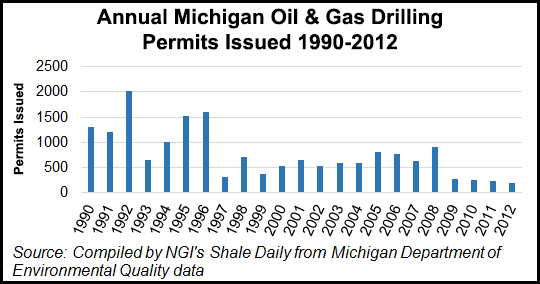NGI Archives | NGI All News Access
Michigan Crafts New Fracking Rules
Despite the fact that they may not be needed anytime soon, Michigan’s Department of Environmental Quality (DEQ) announced Tuesday it is crafting new rules for hydraulic fracturing (fracking) to reflect the concerns of residents and environmentalists.

DEQ regulators have hosted or attended more than 200 public meetings around the state during the past two years. “We have heard loud and clear that there is a growing concern about fracturing,” said DEQ Director Dan Wyant.
DEQ’s proposed fracking changes focus on four key areas:
The draft rules will be submitted to the state Joint Committee on Administrative Rules and will go through a public review process. The DEQ expects to have final rules in place by next year.
There’s no real time pressure on the rulemaking since potential shale development is but a faint glimmer on a far horizon. There are significant shale reserves underlying Michigan, but they are very deep and difficult to exploit, and they are believed to be natural gas, not oil. So it’s unlikely that there will be a tremendous spurt in oil and natural gas activity in the near term to develop them, according to a series of reports released last month by the University of Michigan (U-M) (see Shale Daily, Sept. 9).
“In view of the current low price of natural gas, the high cost of drilling deep shale formations and the absence of new oil discoveries, it is unlikely that there will be significant growth of the oil and gas industry in Michigan in the near term,” according to the analysis, “Hydraulic Fracturing in Michigan Integrated Assessment.”
“However, considerable reserves of natural gas are believed to exist in deep shale formations such as the Utica-Collingwood, which underlies much of Michigan and eastern Lake Huron and extends into Ontario, Canada.” The second part of a two-year assessment designed to lay a foundation for analyzing unconventional drilling policy options is to be completed next spring.
A recent flurry of mineral rights acquisitions in the state associated with exploratory drilling suggests a potential for growth in natural gas production through high-volume fracking, though only a handful of such wells have been drilled to date, the U-M report said.
© 2024 Natural Gas Intelligence. All rights reserved.
ISSN © 2577-9877 | ISSN © 2158-8023 |
